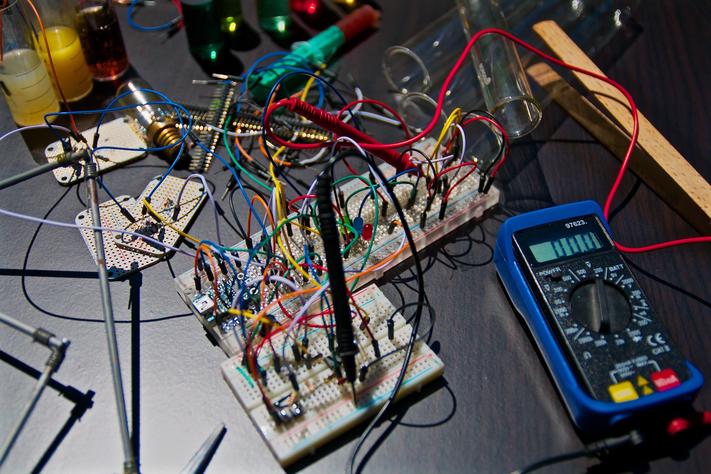A Letter to Those Starting Electrical Engineering
Posted

Dear reader,
Picture the world of the future as it’s described in science fiction: flying cars sweep you away at the touch of a button, robot scouts comb the galaxy for more resources, and ai doctors that can extend your life indefinitely. The unifying fabric of the world of the future is technology, and technology necessitates electrical engineering.
Many people incorrectly believe that electrical engineers either design electronics or work in power plants. In reality, electrical engineers do much more. In my mind there are 7 major fields within electrical engineering and many more closely related disciplines. The major fields include power, microelectronics, circuits, control, signal processing, radio-frequency engineering, and telecommunications. Smaller fields and related disciplines range from quantum computing to bio-electronics. One things I love about about electrical engineering is how broad and far reaching the field is. If any of the fields above are unfamiliar, do some research because it’s best you know what your options are. A good place to start is the wikipedia section on electrical engineering subfields.
Most people’s electrical engineering journey starts in college. If you are aren’t there yet, it’s worth knowing that college is a step up from high school in terms of difficulty. Form good study and time management habits sooner than later. In high school, I was used to walking into tests without studying and doing my homework on the bus ride the day it was due. This layed-back attitude toward school did not get me very far freshman year of college and I quickly needed to form new habits. Many people struggle with forming good study and time management skills in college.
Every school’s electrical engineering (EE) program is different but here is how my program went as an undergrad at Penn State. Freshmen and sophomore year include taking core engineering classes along with your first EE classes. I recommend truly learning the concepts taught in these classes (especially math), as they form the foundation for the rest of your degree. Yes, that means paying attention in calculus and differential equations. Junior year is where things pick up and you get into the meat of your degree. The majority of your core EE courses are taken during this year, some of which will be challenging. My junior year was filled with weekends spent working on projects and cursing at various volumes in the lab. The classes I found most challenging were electromagnetics and nanoelectronics. Your experience may vary. Senior year typically includes finishing your core classes, doing a senior design project, and taking EE electives. The electives taken during your junior and senior year allow you to specialize in one or more area(s) of electrical engineering. I recommend deciding which core class you like the most and taking electives in that area. The journey to obtain a degree in electrical engineering may look long and challenging but, if you have the right mind and determination, electrical engineering is a very rewarding major.
Although undergraduate education is a necessary step toward becoming an electrical engineer, attending school itself is not enough to be great. I highly recommend joining a technical club or applying what you have learned to a personal project, hopefully both. If you love the academic side of school, consider working as a research assistant for a lab on campus. Don’t let a lack of experience be an excuse for not applying yourself outside of the classroom. The truth is, your peers who are working in a lab or are a member of some club don’t really know what they are doing either.
Coming out of school and into industry you learn that the problems you have at work are not like problems from textbooks. Also, much of the knowledge needed at work is learned on the job. That may make it sound like getting a degree is a waste but that is definitely not the case. What a degree offers are the tools and problem solving skills necessary to be a successful engineer. With that in mind, in your undergrad I would focus more on concepts and how to approach problem solving and less on memorizing equations and all the nitty gritty details a professor might ask on an exam. The latter may help you get a good grade, but it will not translate well into industry.
Another thing I have learned since graduating is the importance of architectures and systems thinking. Many courses take too narrow a view and forget to pull back and look at how everything ties together. During your undergrad, take projects one step further and consider how things could be designed so that they are testable, modular, and scalable. Read about systems engineering and architectures. A quick thought experiment or writeup on how to architect your project will go a long way toward making you a more impactful engineer. This may not make sense in the context of a simple project but imagine if the project was more complex, or a piece in a larger system.
I’m confident that electrical engineering will thrive in the years to come so I don’t think you have anything to worry about there. The world of the future will be here one day but we need smart engineers like you to help us get there. I hope that the lessons I learned as a young electrical engineer help you in your journey.
Best of luck,
Joe Hutchinson